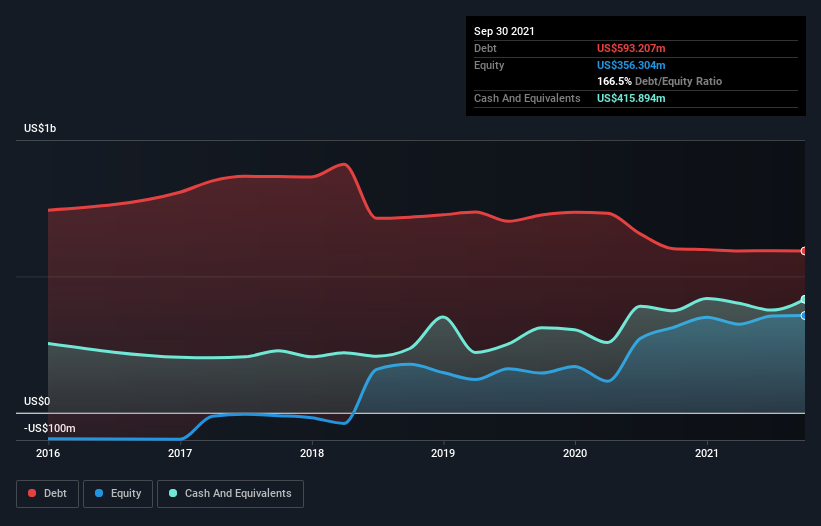- United States
- /
- Diversified Financial
- /
- NasdaqGM:EVOP
EVO Payments (NASDAQ:EVOP) Seems To Use Debt Quite Sensibly
Warren Buffett famously said, 'Volatility is far from synonymous with risk.' So it seems the smart money knows that debt - which is usually involved in bankruptcies - is a very important factor, when you assess how risky a company is. We can see that EVO Payments, Inc. (NASDAQ:EVOP) does use debt in its business. But should shareholders be worried about its use of debt?
When Is Debt Dangerous?
Generally speaking, debt only becomes a real problem when a company can't easily pay it off, either by raising capital or with its own cash flow. Ultimately, if the company can't fulfill its legal obligations to repay debt, shareholders could walk away with nothing. While that is not too common, we often do see indebted companies permanently diluting shareholders because lenders force them to raise capital at a distressed price. Of course, debt can be an important tool in businesses, particularly capital heavy businesses. When we think about a company's use of debt, we first look at cash and debt together.
See our latest analysis for EVO Payments
What Is EVO Payments's Debt?
As you can see below, EVO Payments had US$593.2m of debt, at September 2021, which is about the same as the year before. You can click the chart for greater detail. However, it also had US$415.9m in cash, and so its net debt is US$177.3m.

A Look At EVO Payments' Liabilities
The latest balance sheet data shows that EVO Payments had liabilities of US$599.0m due within a year, and liabilities of US$809.2m falling due after that. Offsetting these obligations, it had cash of US$415.9m as well as receivables valued at US$30.9m due within 12 months. So its liabilities total US$961.4m more than the combination of its cash and short-term receivables.
This deficit isn't so bad because EVO Payments is worth US$2.04b, and thus could probably raise enough capital to shore up its balance sheet, if the need arose. But it's clear that we should definitely closely examine whether it can manage its debt without dilution.
We measure a company's debt load relative to its earnings power by looking at its net debt divided by its earnings before interest, tax, depreciation, and amortization (EBITDA) and by calculating how easily its earnings before interest and tax (EBIT) cover its interest expense (interest cover). The advantage of this approach is that we take into account both the absolute quantum of debt (with net debt to EBITDA) and the actual interest expenses associated with that debt (with its interest cover ratio).
Looking at its net debt to EBITDA of 1.2 and interest cover of 2.7 times, it seems to us that EVO Payments is probably using debt in a pretty reasonable way. But the interest payments are certainly sufficient to have us thinking about how affordable its debt is. Notably, EVO Payments's EBIT launched higher than Elon Musk, gaining a whopping 324% on last year. There's no doubt that we learn most about debt from the balance sheet. But it is future earnings, more than anything, that will determine EVO Payments's ability to maintain a healthy balance sheet going forward. So if you want to see what the professionals think, you might find this free report on analyst profit forecasts to be interesting.
Finally, while the tax-man may adore accounting profits, lenders only accept cold hard cash. So it's worth checking how much of that EBIT is backed by free cash flow. Happily for any shareholders, EVO Payments actually produced more free cash flow than EBIT over the last three years. That sort of strong cash generation warms our hearts like a puppy in a bumblebee suit.
Our View
EVO Payments's conversion of EBIT to free cash flow suggests it can handle its debt as easily as Cristiano Ronaldo could score a goal against an under 14's goalkeeper. But we must concede we find its interest cover has the opposite effect. When we consider the range of factors above, it looks like EVO Payments is pretty sensible with its use of debt. While that brings some risk, it can also enhance returns for shareholders. Of course, we wouldn't say no to the extra confidence that we'd gain if we knew that EVO Payments insiders have been buying shares: if you're on the same wavelength, you can find out if insiders are buying by clicking this link.
At the end of the day, it's often better to focus on companies that are free from net debt. You can access our special list of such companies (all with a track record of profit growth). It's free.
Valuation is complex, but we're here to simplify it.
Discover if EVO Payments might be undervalued or overvalued with our detailed analysis, featuring fair value estimates, potential risks, dividends, insider trades, and its financial condition.
Access Free AnalysisHave feedback on this article? Concerned about the content? Get in touch with us directly. Alternatively, email editorial-team (at) simplywallst.com.
This article by Simply Wall St is general in nature. We provide commentary based on historical data and analyst forecasts only using an unbiased methodology and our articles are not intended to be financial advice. It does not constitute a recommendation to buy or sell any stock, and does not take account of your objectives, or your financial situation. We aim to bring you long-term focused analysis driven by fundamental data. Note that our analysis may not factor in the latest price-sensitive company announcements or qualitative material. Simply Wall St has no position in any stocks mentioned.
About NasdaqGM:EVOP
EVO Payments
EVO Payments, Inc. operates as an integrated merchant acquirer and payment processor worldwide.
Excellent balance sheet and good value.
Similar Companies
Market Insights
Community Narratives




